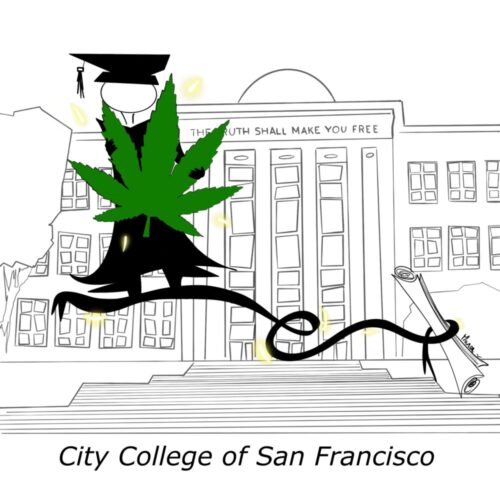City College Launches Nation’s First Cannabis Studies Associate of Arts Degree
City College Launches Nation’s First Cannabis Studies Associate of Arts Degree
By Eleni Balakrishnan
City College’s behavioral sciences department launched the nation’s first Cannabis Studies Associate of Arts (AA) degree program this summer with an “integrative” approach that City College says sets it apart from existing programs.
At a virtual open house introducing the degree in July, department chair Jennifer Dawgert-Carlin said the program will emphasize social equity and integrate three behavioral sciences disciplines: anthropology, psychology and sociology.
While Michigan’s Lake Superior State University offers degrees in Cannabis Chemistry and Cannabis Business, and universities such as Vanderbilt University and University of California Davis offer cannabis-related courses, Dawgert-Carlin said the City College experience is unique.
These universities’ programs focus on “cannabis as a single-use product — cannabis as a substance, cannabis as chemistry or botany, and cannabis as business. And while these are really important aspects of cannabis, we felt that we have something to add to the discourse that we did not see in the other academic programs,” Dawgert-Carlin said. At City College, cannabis will be a framework for “better understanding human behavior,” she added.
In addition, City College will offer the only program that is free and fully available online through City Online.

Demand for cannabis education has been growing for years especially since Prop. 64 passed in 2016, legalizing recreational cannabis sales in California.
“A large study revealed that 80% of San Francisco residents reported interest in studying topics on cannabis,” Dawgert-Carlin said.
Amber Kakepoto, 27, a health information technology student, said the new program is a step toward social acceptance of professions in cannabis.
“When your parents hear that you can go to college for something like this, it changes the attitude, it changes the conversation,” Kakepoto said. “You’re taken more seriously in the room.”
Dawgert-Carlin said she and adjunct instructor of sociology Blayke Barker worked together to develop the degree program and the two “have been talking about cannabis for several years.”
Barker developed one of the program’s three required courses; Introduction to Cannabis Studies (SOC 55).
Various faculty and community members logged into the open house, including Dr. Karin Hu, who developed another required course; Psychology of Psychoactive Drugs (PSYC 50).
These two courses along with Anthropology of Cannabis (ANTH 50) will become available in Spring 2021.
Until then, students can get started on the degree this fall by choosing from four electives in Health, Latin American and Latino Studies, or Administrative Justice. Nine credit hours of electives are required, making for a total of 18 units to complete the degree.
Dawgert-Carlin said more elective options will be added to the curriculum over time, including a Cinema course and a Communication Studies course which are in the works.
She also hopes that the new program’s courses will be transferable to four-year universities soon.
At the open house, Interim Chancellor Rajen Vurdien said, “The college is known for innovation and change and groundbreaking programming. This shows how fast the college moves to address societal programs and issues, and at the same time to address the needs of the job market as they emerge.”
The cannabis website Leafly’s jobs report of 2019 noted that the cannabis industry is the largest single job creator in the country.
“New and expanding programming like Cannabis Studies also allows City College to stay relevant, meet the needs of our current students, and attract new students with meaningful and transferable coursework,” Vurdien said.
This is only “the first of many steps and the beginning of a series of wonderful partnerships between this college and the cannabis thought leadership and the cannabis industry here in San Francisco,” said Tom Temprano, vice president of the Board of Trustees.
Members of the local cannabis industry are also excited. Paul Velasquez, 31, an independent grower from Oakland said there would “absolutely” be interest in the program among his colleagues.
Behavioral science is “a segment I always felt was underrepresented [in other programs], and how cannabis affects the person,” Velasquez said. He believes more research is necessary for people to fully understand cannabis and its use.
Director of San Francisco’s Office of Cannabis Marisa Rodriguez said, “Just because something becomes legal, it doesn’t necessarily absolve it of its stigma. But an accredited institution that can show the importance of having not only these conversations but digging deep and identifying areas that matter, really helps us advance the cause in a way that we can’t just do alone.”
